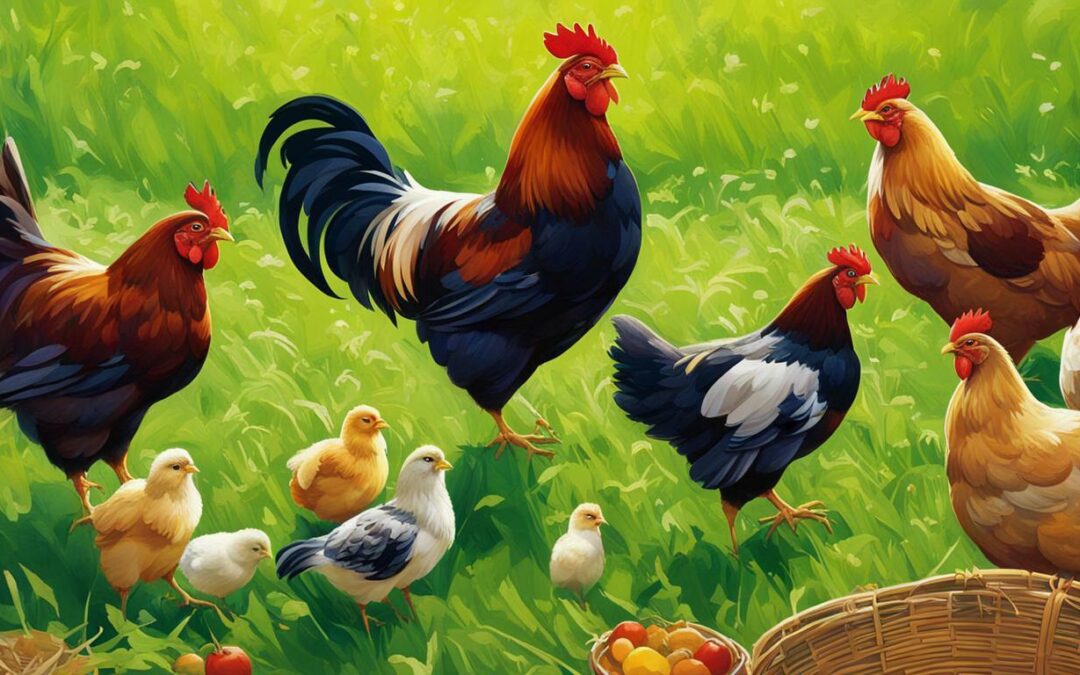Chickens can consume alfalfa as part of their diet, but it is essential to understand the benefits and potential risks associated with feeding them this forage feed. Alfalfa is a highly nutritious plant that is rich in protein and calcium, making it a valuable addition to a chicken’s diet. However, like any food, it should be fed in moderation to avoid digestive upsets and health problems. It is also important to provide chickens with a diverse and balanced diet to ensure their overall health and well-being.
Key Takeaways:
- Alfalfa is a highly nutritious forage feed that can be included in a chicken’s diet.
- It is rich in protein and calcium, which contribute to chicken health.
- Feeding alfalfa to chickens should be done in moderation to avoid digestive upsets and health problems.
- Other plants that chickens can consume include grass, clover, hay, wheat, and barley.
- Alfalfa can be fed to chickens in various forms, such as pellets, hay, or sprouts.
Nutritional Benefits of Alfalfa for Chickens
Alfalfa offers chickens numerous nutritional benefits, primarily due to its high protein and calcium content, making it an excellent addition to their diet. This forage feed is packed with essential amino acids, which are crucial for muscle development and overall growth in poultry. The high calcium content in alfalfa not only supports strong bone health but also contributes to the production of sturdy eggshells, ensuring the well-being of both hens and their offspring.
In addition to protein and calcium, alfalfa contains a variety of other vitamins and minerals that provide chickens with a well-rounded nutrient profile. It is rich in vitamin A, which promotes good vision and boosts the immune system, helping chickens fight off infections and diseases. Vitamin K, another essential nutrient found in alfalfa, plays a vital role in blood clotting, ensuring that chickens recover quickly from cuts or injuries. Furthermore, the fiber content in alfalfa aids in digestion, keeping the chickens’ digestive tract healthy and functioning properly.
Chickens can greatly benefit from including alfalfa in their diet. It provides them with a source of high-quality protein and essential minerals, promoting their overall health and well-being.
When considering alfalfa as chicken feed, it’s important to note that the form in which it is fed can impact its nutritional benefits. Alfalfa can be fed to chickens as pellets, hay, or sprouts. Pellets are a convenient and easy option, as they provide a concentrated source of nutrients. Hay, on the other hand, can be a natural and cost-effective way to feed alfalfa, but it requires proper storage to maintain its nutritional value. Sprouts offer a fresh and varied diet, providing chickens with a different texture and taste experience.
However, it’s crucial to introduce alfalfa into a chicken’s diet gradually and in moderation to prevent any digestive upsets. Large amounts of alfalfa can cause bloating, diarrhea, or other health problems, so it’s best to start with small portions and observe how the chickens respond. Additionally, providing plenty of water is essential, as alfalfa can be dehydrating. A diverse and balanced diet is key to maintaining the overall health of chickens, so while alfalfa is a beneficial addition, it should not be the sole component of their diet.
Feeding Alfalfa to Chickens: Dos and Don’ts
When feeding alfalfa to chickens, it is crucial to follow certain guidelines to promote digestive health and avoid potential health issues. Alfalfa is a highly nutritious forage feed that can be a valuable addition to a chicken’s diet, but it should be introduced gradually and fed in moderation.
Dos:
- Gradually introduce alfalfa into the chicken’s diet to allow their digestive system to adjust. Start with small amounts and gradually increase the quantity over time.
- Feed alfalfa in various forms, such as pellets, hay, or sprouts, to provide variety and prevent boredom.
- Ensure chickens have access to fresh water at all times when consuming alfalfa, as it can be dehydrating.
- Monitor their intake and adjust portion sizes accordingly. Too much alfalfa can lead to digestive upsets and health problems.
- Include other plants in their diet to ensure a well-rounded and balanced nutrition. Grass, clover, hay, wheat, and barley are suitable options.
Don’ts:
- Avoid feeding large amounts of alfalfa to chickens, as it can cause digestive upsets such as bloating or diarrhea.
- Do not abruptly switch a chicken’s diet to mainly alfalfa, as it may disrupt their digestive system and lead to health issues.
- Avoid feeding moldy or spoiled alfalfa to chickens, as it can cause illness.
- Do not solely rely on alfalfa as the primary source of nutrition for chickens. It should be part of a diverse and balanced diet.
Proper feeding practices for chicken health
“Feeding chickens a diverse and balanced diet is crucial for their health.”
By following these guidelines, chicken owners can safely incorporate alfalfa into their poultry’s diet. Providing the right balance of nutrients and offering a variety of plant-based feeds can help maintain optimal chicken health and overall well-being. However, it is always recommended to consult with poultry nutrition experts for personalized guidance on specific dietary needs and requirements.
Potential Risks of Feeding Chickens Alfalfa
While alfalfa can be beneficial for chickens, it is essential to be cautious about the quantity they consume, as excessive amounts can lead to digestive upsets and various health issues. It is important to remember that moderation is key when incorporating alfalfa into a chicken’s diet. Here are some potential risks to consider when feeding chickens alfalfa:
- Digestive Upsets: Chickens have delicate digestive systems, and consuming too much alfalfa can disrupt their balance. Overconsumption of alfalfa can cause bloating, diarrhea, and even impacted crops, which can be a serious condition. It is crucial to monitor their intake and adjust accordingly.
- Calcium Imbalance: While alfalfa is rich in calcium, an excessive amount can lead to a calcium imbalance in chickens. This can result in kidney issues, such as kidney stones or gout. It is important to provide a diverse diet that includes other calcium sources to prevent an overabundance of calcium from alfalfa.
- Dehydration: Alfalfa has a high fiber content, which can be dehydrating for chickens. Ensure they have access to fresh water at all times, especially when incorporating alfalfa into their diet. Hydration is crucial to prevent digestive issues and maintain overall chicken health.
To prevent these potential risks, it is recommended to gradually introduce alfalfa into a chicken’s diet. Start with small portions and observe their response. Monitor their health and digestion to ensure there are no adverse effects. Additionally, providing a varied diet that includes other forage feeds, grains, and vegetables will help maintain a balanced nutritional intake for chickens.
“Moderation is key when feeding chickens alfalfa. It is important to consider the potential risks such as digestive upsets, calcium imbalance, and dehydration. To ensure the well-being of your chickens, gradually introduce alfalfa into their diet, monitor their response, and provide a diverse and balanced feeding plan.”
Conclusion
In conclusion, alfalfa can be a nutritious addition to a chicken’s diet, but it should be fed in moderation and within the context of a balanced poultry diet. Chickens can consume alfalfa, which is a highly nutritious forage feed containing high levels of protein and calcium. These nutrients are essential for maintaining optimal chicken health.
However, it is important to remember that too much alfalfa can cause digestive upsets and health problems in chickens. To avoid these issues, it is recommended to introduce alfalfa gradually into their diet and monitor portion sizes. Providing plenty of water for chickens is also crucial as alfalfa can be dehydrating.
In addition to alfalfa, there are other plants that can be included in a chicken’s diet to ensure a well-rounded nutritional intake. Grass, clover, hay, wheat, and barley are among the options that can complement the chicken’s diet and contribute to their overall health.
To maintain optimal chicken health, it is crucial to feed them a diverse and balanced diet. Consulting with poultry nutrition experts can provide personalized guidance on a chicken’s specific dietary needs and help ensure they are receiving all the necessary nutrients for their well-being.
FAQ
Q: Can chickens eat alfalfa?
A: Yes, chickens can eat alfalfa. It is a highly nutritious forage feed that is high in protein and calcium.
Q: How should I feed alfalfa to my chickens?
A: Alfalfa can be fed to chickens in various forms such as pellets, hay, or sprouts. It is important to gradually introduce it into their diet and provide plenty of water.
Q: What other plants can chickens eat?
A: Chickens can also eat grass, clover, hay, wheat, and barley, among other plants. A diverse and balanced diet is crucial for their health.
Q: Are there any risks associated with feeding chickens alfalfa?
A: Yes, large amounts of alfalfa can cause digestive upsets and health problems in chickens. It should be fed in moderation.
Q: What are the nutritional benefits of alfalfa for chickens?
A: Alfalfa is high in protein and calcium, which are important for chicken health. It provides valuable nutrients to their diet.

